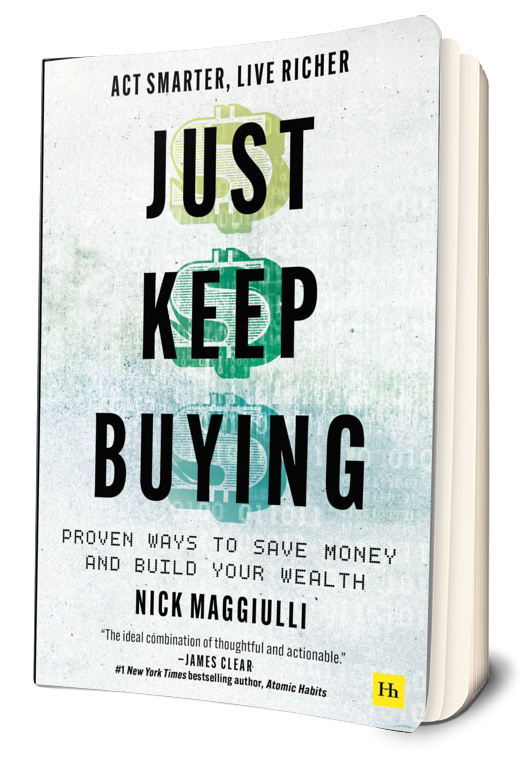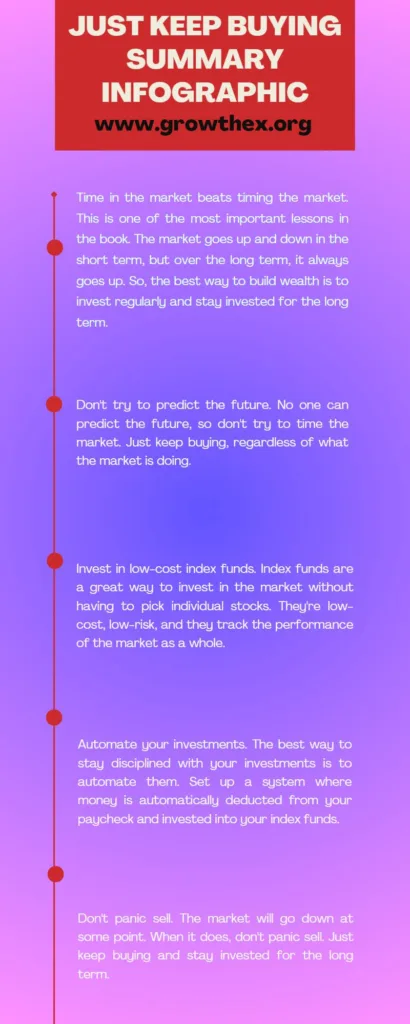Just Keep Buying acknowledges that your wants and interests will vary throughout your life and that, as a result, your financial behavior will have to adapt as well. It does this by using creative stories and intriguing data to help you answer the major questions about saving and investing money.

Todd Rose details one of the US Air Force’s biggest mistakes in The End of Average: They requested more than 4,000 pilots in 1950 to do 140 measures on each person. The aim? Create the ideal cockpit for a jet. After that, they set to work constructing a cockpit that was…unusable using the averages of all the measurements they had gathered.
No pilot was able to enter the new cockpit since none of them fit the average across all data points. The US Air Force discovered that day that neither “the average person” nor “the average financial advice” exist. What about the relationships we have with money if our bodies are so different?
In Nick Maggiulli’s opinion, one-size-fits-all financial advice Nick Maggiulli’s opinion, is useless because there are so many different situations. Maggiulli takes a different tack in Just Keep Buying. He demonstrates to us the necessity of changing our financial behaviour through time by using scientific data and observations from nature.
Instead of using a set saving rate, try “saving what you can, when you can.”
For many years, the Dolly Varden trout, an Alaskan fish species, baffled experts. The fish continued to flourish all year despite only having a limited window of abundant food each year when salmon lay eggs in their waters. Why did they succeed?
In the end, scientists learned that the fish’s digestive organs change size in response to the availability of food. They increase their metabolism so they may consume more calories when the salmon appear. They then delay down digestion when the other fish leave. They can survive the rest of the year on much less food this way!
Maggiulli claims that this situation teaches us to save what we can when we can. It is absurd to rely on a set, required savings rate.
To begin with, those in poverty have significantly less room for savings. “Just taking away 10% won’t help” if your rent and eating expenses consume all of your money. But even those who are wealthy discover that their income changes significantly over time. Personally, I made twice as much money in 2020 as I did in 2021. I was unable to have saved the same amount throughout the course of the two years.
Try adapting instead of worrying over a fixed savings rate and feeling awful when you don’t meet it. Save a little more during good times to use during difficult ones. Additionally, keep in mind that it’s acceptable to spend extra on caring for your family and yourself during this time when things are tough.
Instead of slashing expenses till you’re miserable, increase your revenue.
I invested in cryptocurrencies and made the traditional mistake of getting carried away during the bull market. As my holdings increased, I put more effort into managing them. I tried moving money from position A to position B, but it had no impact. I put in fewer hours at work and spent more time reading market news. Naturally, when the music stopped, my portfolio declined along with everyone else’s.
According to trader and investor Carter Thomas, I should have left the market alone, just as I would have in a down market. My portfolio would have performed almost identically if I had concentrated more on my work, but I might have doubled my income.
Increasing your income is probably the best way to increase your savings, not decreasing it. Even if you decrease your spending in half if you make $3,000 per month and spend $2,000 per month, your savings will only increase by 50%. What if, though, you could earn $10,000 per month? You could save four times as much money and still spend the same amount!
The majority of individuals try to decrease expenses until they are miserable, but it is not a viable strategy for retiring. What use is it if you only arrived there after 30 years of stress? Instead, Maggiulli advises you to increase your income, and of course one method to achieve this is to “just keep buying”—continue to purchase broad stock market ETFs that will eventually result in a portfolio income.
Your ability to save money is constrained, but your ability to earn additional money is almost limitless. Make revenue growth a priority!
The main issue we face with money is determining our priorities in life.
One factor contributing to our collective financial stress is the widespread financial advice that makes us feel bad about using our money. “Save money diligently.” “Remember to enjoy your retirement!” Despite the good intentions behind these suggestions, our culture has become one in which we constantly worry about money.
According to a Gallup poll cited by Maggiulli, our stress levels can potentially exceed the advantages of saving money if we are overly concerned about it. Where does prudent saving end and lowering your standard of living begin? You must respond to that query.
In essence, deciding how much to save and how much to spend is not the real issue presented by money. To allocate the appropriate sums of money to the appropriate causes at the appropriate times, we must first choose what is most essential to us. That’s a significant problem, which is why discussing money is so difficult.
Maggiulli recommends starting with Daniel Pink’s book Drive. According to the book, factors that contribute to long-term contentment include autonomy, mastery, and purpose. As a result, every dollar we spend on those goals, even a daily cappuccino, can improve our quality of life.
Do not worry about your money. Do your best, believe in yourself, and if all else fails, “just keep buying.”
Just Keep Buying Review
In “Just Keep Buying,” Nick Maggiulli offers a perceptive and captivating examination of the ideas and tactics that underpin successful investment. Maggiulli dispels the fallacies surrounding investment methods and offers helpful guidance for both inexperienced and seasoned investors because to his outstanding ability to make complicated ideas simple.
The emphasis on a long-term investment perspective is the book’s main strength. Maggiulli advises readers to avoid being seduced by quick profits and instead concentrate on the value of compounding and steadfast investing. He emphasizes the value of investing over time rather than attempting to time the market, a concept that is supported by in-depth research and practical examples.
Readers from all walks of life can understand difficult financial topics because to Maggiulli’s refreshingly straightforward and approachable writing style. He skillfully strikes a balance between his explanations and relatable examples and real-world experiences to make the information presented both interesting to read and educational. The author’s communication skills are demonstrated by his ability to take complex thoughts and divide them into manageable chunks.

If you really like this “Just Keep Buying Book Summary” by Growthex then you can also check out some more amazing posts | summaries which are freely available on this platform :